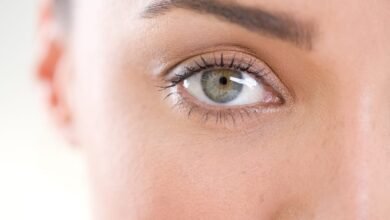There’s a Big Connection Between Gut and Skin Health. Why Aren’t We Talking About It?


Your gut microbiome, and all the “good” and “bad” bacteria living in it, is like its own little city or ecosystem. How well it functions has been linked to many other measures of your overall health, including immunity, mental health, our environment, medication history and more. This is why, while it’s complicated, “gut health” remains one of the hottest topics in the wellness world right now.
One gut-health relationship that researchers have been watching is the gut-skin axis. The reasons why skin problems often run hand in hand with gut problems aren’t fully understood.
“There are a lot of diseases that have overlap between the gut and the skin,” said Dr. Hadar Avihai Lev-Tov, a board-certified dermatologist and associate professor of dermatology at the University of Miami Health System’s Dr. Phillip Frost Department of Dermatology and Cutaneous Surgery. “The question is always, What is the root of this connection?”
Some of those roots grow from the depths of our gut microbiome, and more importantly, the imbalance or lack of diversity in it, called “dysbiosis,” according to Dr. Niket Sonpal, a gastroenterologist and clinical assistant professor at Touro College of Osteopathic Medicine. And as is true for many things about your health, the impacts don’t stay limited to a single organ or system — the gut, in this case.
“There are some studies that show that the gut microbiome in patients who have acne is actually less distinct and less diverse than those who don’t have acne, so we know that plays a role,” Sonpal noted, adding that there’s also a relationship between how the microbiome may affect the immune system and its responses in people with other conditions like eczema.
However, he said that the “exact mechanism” of how skin health may be linked to gut health is still unclear.
“It’s so diverse, and the microbiome is as unique as each individual person,” Sonpal said.
Here’s what we know today.
Acne, gut health and the limited number of acne treatments
Acne vulgaris is a common skin condition that happens when hair follicles get clogged — it happens in about 85% of adolescents, according to the American Academy of Dermatology, and continues into adulthood for many people.
Though acne has different causes and varies in severity (some people’s acne may be mostly due to hormonal responses, for example, while other cases may be more limited or worsened by skin care products or sweat), people with acne may be more likely to experience gut issues like irritable bowel syndrome, according to one preliminary 2020 study from Turkey. Researchers found that IBS was “significantly” more common in patients with acne than those without.
Sonpal says that the “vast majority” of his consultations are for irritable bowel symptoms, and he notices an overlap between them, the presence of acne and other symptoms potentially related to the gut, including fatigue. Asked why IBS is so common (between 10% and 23% of adults worldwide have IBS, according to a 2022 estimate), Sonpal pointed to a Western diet largely dependent on processed foods, a lack of fiber and too many antibiotic prescriptions as some potential factors.
However, the relationship between gut health and skin doesn’t go in one direction, and the use of antibiotics is another point where skin health and gut health may merge. Antibiotics are commonly prescribed as a treatment for some cases of acne and endorsed by the AAD for short-term use. But because there’s a well-known relationship between taking antibiotics and the disruption of the gut microbiome (antibiotics kill bacteria, including the “good” ones in your gut), this means that people with acne may end up with gut-health effects if they’re prescribed antibiotics as treatment.
Lev-Tov acknowledges the gut disruption that comes with taking antibiotics, as well as the public health problem of antibiotic resistance that comes from too many people being prescribed too many antibiotics. But he says that for some patients with acne, treatment with antibiotics is the best course of action, as many cases can cause pain, tears in the skin and generally disrupt someone’s quality of life. Antibiotics, for all their gut-destroying properties, can significantly help.
“They need treatment, and they deserve it,” Lev-Tov says, adding that dermatologists are limited in their treatment options for acne patients. For people with acne that benefits from treatment, routes are mostly limited to medications that curb androgen hormones like testosterone (birth control pills and spironolactone); isotretinoin or Accutane (which Lev-Tov says is heavily regulated because of the risk of birth defects if taken during pregnancy); and certain antibiotics.
“I’d like the lesson in that to be, We need more innovation,” Lev-Tov says.
Read more: Who Should Be Taking Probiotics for Gut Health?

Sourdough is one of many foods that are good for your gut. (And potentially, your skin.) Check out a list of 12 foods to get you started here.
Eczema, gut health and the immune system’s role
Some people with eczema may potentially reduce their symptoms or flare-ups by making changes to their diet, one of which includes adding probiotics or gut-friendly foods. According to Zoe, a health science company that studies gut health, the most common type of eczema (atopic dermatitis) may be linked to gut health because of the way the gut microbiome influences the immune system, which then influences skin flare-ups and sensitivities like eczema.
Some research has found that people with atopic dermatitis have a higher or lower amount of certain types of gut bacteria, according to Zoe.
The idea behind this is that the microorganisms in the gut “cause an excess amount of certain types of white blood cell reactions,” Sonpal explained. “And those white blood cells are reacting to a chemical that’s in the gut, and that chemical makes them fight the barrier,” which in some cases, leads to skin reactions.
One firmer implication of the gut microbiome causing skin problems is in the case of patients with hidradenitis suppurativa (HS), a non-contagious skin and immune condition that causes often painful blemishes in places where skin rubs against skin, like the armpits or groin. Lev-Tov, who is the president of the HS Foundation, says that experts know HS is associated with inflammatory bowel disease, and that “improving the gut microbiome may actually help to prevent disease.”
‘You feel like you’re at Hogwarts at Whole Foods’: What to eat for happy skin and a healthy gut
While experts continue to work on solutions for the gut-skin axis, the simplest tool we have at our disposal to improve gut health may be adding the right foods to our diet. According to Sonpal, the first thing you should do if you suspect your gut health is responsible for your skin condition is to take inventory of your diet: Is it diverse enough? Are you getting enough fruits, veggies and plant-based foods when compared with processed foods?
Naturally occurring prebiotics and probiotics are abundant in delicious natural foods like yogurt, sauerkraut and more, and simply adding these foods to your diet can improve your health, especially if your diet didn’t include a wide-enough picture of all the “good” bacteria out there that your gut craves to maintain its microbiome. This means you don’t necessarily need to buy an expensive bottle of pre- or probiotics. Comparing supplements and health-marketed foods to “potions” and “magical elixirs,” Sonpal says it’s easy to feel discouraged walking down the grocery aisle.
“You feel like you’re at Hogwarts at Whole Foods,” Sonpal said. “It’s extremely overwhelming.”
“A very simple sauerkraut, which is extremely inexpensive, is just as good as that ‘bajillion-pill’ in the freezer aisle that costs a co-pay,” Sonpal said.




